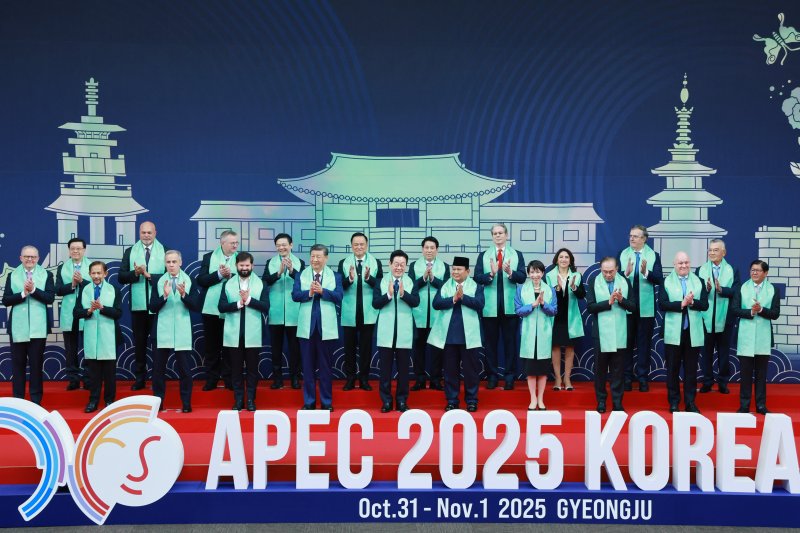Big Deal with the US, Restoring Ties with China... Balanced Diplomacy Shines [APEC Gyeongju Wrap-up]
- Input
- 2025-11-02 18:31:38
- Updated
- 2025-11-02 18:31:38

According to the Office of the President, during the South Korea-China summit held at the Gyeongju National Museum on the 1st, President Lee Jae Myung and Chinese President Xi Jinping reaffirmed their commitment to restoring bilateral relations, describing the two countries as ‘inseparable partners in cooperation.’ President Xi expressed his pleasure at visiting Korea for the first time in 11 years, while President Lee responded that he had been looking forward to meeting in person. The two leaders discussed and agreed on practical measures for cooperation, including supply chain stability, expanded cultural and youth exchanges, and enhanced economic and industrial collaboration.
At the state dinner, President Xi quoted the poem ‘Beomhae’ by Choe Chiwon, a renowned scholar from Gyeongju during the Silla Dynasty, saying, ‘The friendship between China and Korea continues to flourish today.’ President Lee replied, ‘We must carry the Korea-China relationship forward to future generations.’ The dinner was also attended by business and cultural figures, signaling a thaw in previously strained relations. Notable attendees included Lee Jae-yong, Chairman of Samsung Electronics; Chey Tae-won, Chairman of SK Group; Chung Eui-sun, Chairman of Hyundai Motor Group; and Koo Kwang-mo, Chairman of LG Group.
Earlier, at the South Korea–United States summit on the 29th of last month, meaningful progress was made in both economic and security spheres. President Lee and US President Donald John Trump agreed to adjust the structure of South Korean investments in the US, incorporating the principle of ‘commercial rationality’ into the agreement. South Korea’s annual cash investment cap was set at $20 billion, preventing demands for full upfront payment, and it was reported that the fact sheet would specify tariff levels for the semiconductor sector.
The two leaders also agreed on the necessity of introducing nuclear-powered submarines and to begin follow-up consultations. Wi Sung-lac, Director of the National Security Office, stated in a briefing that a key outcome was confirming the US’s willingness to actively cooperate on various strategic issues for alliance modernization.
However, during this Super Week, a meeting between North Korean leader Kim Jong Un and President Trump did not take place. President Trump stated he was ‘open to resuming dialogue with North Korea’ and expressed his intention to ‘meet Chairman Kim Jong Un next time he returns.’ President Lee commented, ‘This in itself helps foster a sense of peace on the Korean Peninsula,’ and added, ‘We will play the role of a pacemaker in creating the right conditions.’
At the Korea-Japan Summit, both countries focused on future-oriented cooperation without referencing historical issues. Notably, Japanese Prime Minister Sanae Takaichi emphasized the growing importance of trilateral cooperation among Japan, South Korea, and the United States, mentioning South Korea before the US, which drew attention.
On the final day of the Gyeongju summit, the ‘APEC Gyeongju Declaration’ was adopted. Instead of a phrase supporting the World Trade Organization (WTO) and multilateralism, a compromise evaluating the outcomes of the ministerial meeting was proposed and agreed upon under South Korea’s leadership. This demonstrated South Korea’s role as a mediator between US protectionism and Chinese multilateralism.
Political and diplomatic circles have assessed that South Korea has effectively implemented ‘balanced diplomacy’ through this summit. The country secured practical interests in negotiations with the US, restored relations with China, and maintained trust with Japan. The APEC Gyeongju Declaration is also seen as a success in restoring the framework for multilateral cooperation amid US-China rivalry. However, procedural challenges such as formalizing agreements and obtaining parliamentary approval remain, and maintaining balance will be crucial if US-China tensions reignite.
west@fnnews.com Sung Seok-woo, Seo Young-jun Reporter